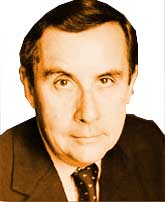|
|
William Pfaff
 Clinton's foreign policy does have a sunny side, too
Clinton's foreign policy does have a sunny side, too
PARIS -- A constant reader recently complained that everything I have to say about America's foreign policy is criticism. Don't I have something favorable to say?, he asked.
This seems a fair question, which deserves an answer. I have actually had good things to say about Clinton Administration foreign policy, but not many. I'll explain below why this is so, but first I will name some of the accomplishments of this government.
The Irish and British prime ministers and Unionist and
Nationalist leaders have just concluded an historic agreement
on the future of Northern Ireland. This would not have been
achieved -- not at this point, or in this form,  at least -- had the
Clinton administration not interfered in what was not its
business, and forced everyone's hand on the Irish question --
supplying, as well, an able and now triumphant mediator,
former Senator George Mitchell.
at least -- had the
Clinton administration not interfered in what was not its
business, and forced everyone's hand on the Irish question --
supplying, as well, an able and now triumphant mediator,
former Senator George Mitchell.
Once the United States decided to act in the Bosnian crisis, it did so brilliantly. Indirect intervention in Croatia produced the Serbs' first, but decisive, military defeat. Richard Holbrooke's subsequent diplomatic performance was not only bravura (infuriatingly so to many Europeans, as well as to some colleagues in the Clinton administration), but was intelligent, determined, even brutal, and a success.
The Dayton agreement the United States bullied everyone into accepting has thus far worked -- and worked far better than any of its critics expected. Mr. Holbrooke is now trying to do the same thing in Cyprus.
American diplomacy elsewhere in the Balkans, in Serbia, Montenegro, Kosovo, Albania, the Macedonia-Greece and Greek-Turkish quarrels, has over the last six years (and more) been discrete, determined, and effective in its efforts to contain deep and dangerous conflicts.
Relations with Russia (excepting NATO expansion, of which more below) and with the European powers have been adequately if erratically handled under Mr. Clinton; the performance, however, has been weaker than under the Bush administration.
Clinton administration Asian policy is open to greater criticism, reflecting the overall weaknesses of this government's foreign policy, which are intellectual and practical: its illusions about the connection of market economics with political stability, and its lack generally of geopolitical coherence and political realism in the first case, and its overall subordination to commercial interests and domestic political lobbies in the second.
Commercial access to foreign markets and investment are obvious American interests. Under this government they have been wrapped in a shallow and false ideology of the interconnectedness of American-style capitalism with democracy and universal social progress, which has actually done harm to American relations with Russia and a part of Asia.
Intervention in the Irish affair was politically inspired, to please a domestic lobby. So was Mr. Clinton's just-completed African tour. So is U.S. Cuban policy -- as has been the case during four decades. America's entire Near and Middle Eastern policy is dominated by Israel's interests, a phenomenon of the last twenty or so years.
A democracy's foreign policy should reflect domestic opinion, but all would agree that the national interest should prevail over partisan interest, and under the Clinton presidency, even more than in previous administrations, this has not happened. In the Middle Eastern case this now has become an extremely serious problem, as the collapse of the Gulf War coalition demonstrated.
An article by David Calleo of the Paul Nitze School at Johns Hopkins University details cases of this administration's lack of geopolitical realism. It appears in the forthcoming issue of World Policy Journal (published by the New School in New York).
Mr. Calleo writes, for example, that the long-term American (and international) interest in Asia obviously lies in the constructive balance of emergent Chinese power. In that case, Russia's cooperation is needed, which is exactly what NATO expansion is undermining. This NATO policy is creating new and unnecessary tensions with Russia over the status of the Baltic countries and Ukraine, and interfering with that reconciliation of Russia with the West which is an absolutely fundamental U.S. and European interest.
He says that "it is difficult to see the rationale for an American policy that deliberately picks an unnecessary quarrel in Europe and, at one stroke, also antagonizes its most useful future ally in Asia."
In its second term, Clinton foreign policy has also incorporated a braggadocio previously found mainly among the neo-conservative "hegemony" theorists, convinced that America's manifest destiny is to run the world.
We "stand taller" and "see farther," as Madeleine Albright recently expressed it, and therefore don't need advice from Kofi Annan, or the other nations on the UN Security Council, or Nelson Mandela or the Pope, while we manage the world's affairs. As Mr. Calleo says, "There is a prevailing smell of hubris." And as both the Greeks and the Book of Proverbs have told us, hubris goeth before the fall.
Critics of my nagging may not be satisfied with this apology,
but will admit that there is a general argument behind my
complaints about the United States. Nagging, in any case, is
what column-writing is all about -- together with issuing
jeremiads and playing Cassandra (a demonstration that the
trade has both biblical and classical
4/8/98: Public interest must control marketplace
4/5/98: Great crimes don't require great villians
3/29/98: Authority rests on a moral position, and requires consent
3/29/98:Signs of hope in troubled Russia
3/25/98: National Front amassing power
3/23/98: NATO's expansion contradicts other American policies
3/18/98: The New Yorker sought money, but lost it
3/16/98: America's 'strategy of tension' in Italy
3/13/98: Slobodan Milosevic may have started something that can't be stopped